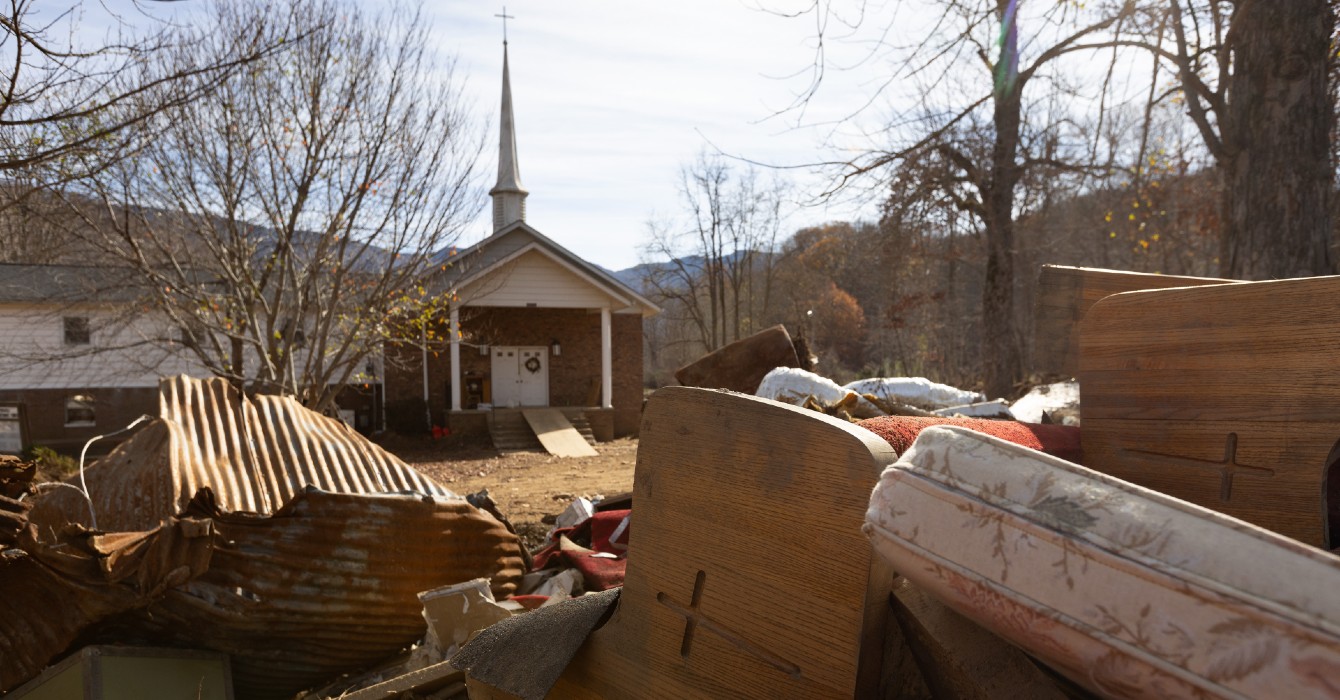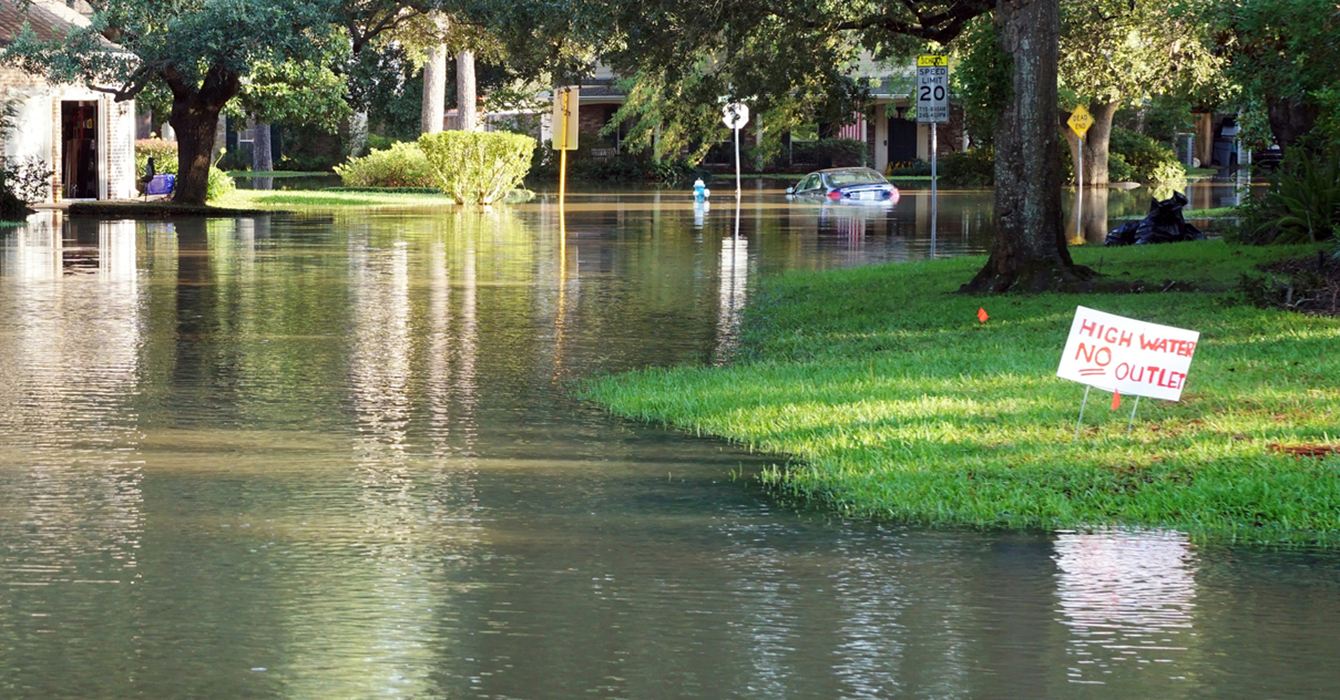In 2007, when he was a young pastor at a church plant in Salem, Oregon, the Rev. D.J. Vincent noticed that a group of unhoused people had been living in Cascades Gateway Park. He and his parishioners wanted to do something to help them out and settled on a simple idea: They’d host a potluck.
That impulse to share a single meal started a ministry that has grown into a multimillion-dollar nonprofit called Church @ the Park. It now offers outreach services, workforce development, emergency shelter and permanent housing to the area’s unhoused population. In 2024 they served nearly 2,000 people across six locations.
As Church @ the Park evolved, so too did Vincent’s approach to ministry. From his conversations with unhoused folks at the meals, he gained a new perspective about dignity, humility and relationships. He felt he needed to change the way he was thinking about his service work; in looking for guidance he came across Street Psalms, a faith-based organization committed to developing strong community leaders.

The organization, a network of more than 40 organizations in 100 cities around the world, was formed to help create “communities in mission” that foster human flourishing in urban spaces. Street Psalms is based on “theology from below” — that is, learning alongside people at the margins rather than imposing solutions from above. This approach aligned with Vincent’s experience at the potlucks.

“The spirit of God exists in this community, and we had to learn how to listen,” Vincent said. “I started to see how important it is to do things with people, not just for people.”
In Street Psalms, Vincent found an enriching framework for serving his community. The organization promotes cities of peace, with a special emphasis on caring for the most vulnerable. Their approach is like a fungal ecosystem. Mushrooms are the fruit of an intricate network of mycelia, the thread-like roots that connect trees, share nutrients, and create the conditions for new life to flourish. Church @ the Park is one of the mushrooms, and Street Psalms is the underground network of relationships and shared wisdom that makes it possible.
“Street Psalms created a bubble of belonging for us,” Vincent said. “They value connectedness and relationship, and our organizational values are the Street Psalms values. We aren’t just a place for people to get resources, but where they can find value and dignity and responsibility.”
Learning to be peacemakers
Street Psalms calls itself a “sodal” expression of the church, as opposed to a more traditional “modal” one. “Sodal” comes from the Latin “sodalitas,” meaning “companion” or “partner.” The organization uses this description to explain how it seeks to develop leaders who are embedded in vulnerable urban communities, people who are trying to enact meaningful change in their cities.
“We’re an urban monastery without walls,” said Sarah Moore, Street Psalms’ senior fellow for applied research, who came to the organization after a career as a psychology professor. “We prepare people for the challenges they face out in the real world of service.”
What are the invisible or less visible support networks that help your ministry thrive?

They teach a set of questions they call the Incarnational Framework, based on four concepts that go by the shorthand “See, Do, Be, Free.” It starts with three questions:
- Does your way of seeing call you out of the myth of scarcity and into the reality of abundance?
- Does your way of doing call you out of theory and into practice?
- Does your way of being call you out of rivalry and into peacemaking?
Living according to these three values — prioritizing abundance over scarcity, action over ideas, peacemaking over rivalry — leads to the end goal of nurturing a comprehensive sense of “gospel freedom,” one founded in love, mercy and service. It’s the capacity to act without reacting and to live in accordance with the Spirit, not just self-interest. The framework is used as part of a training guide and is a diagnostic tool to help leaders examine their own approach to transforming their communities.
“The framework is very much a part of what I’m doing as a pastor and what I want our congregation to become,” said the Rev. Lina Thompson, pastor at Lake Burien Presbyterian Church, just south of Seattle. Thompson, who is on the
Street Psalms staff, leans on the framework in all aspects of her work. “I go into weekly meetings and think about abundance and about how we can be peacemakers.”
Forming leaders who serve communities
Thompson has been with Street Psalms since it was founded in the 1990s. The organization initially served urban youth workers in Philadelphia and was an initiative of the Pew Charitable Trust. Kris Rocke, the current executive director, had written a curriculum for World Vision, a youth mentorship organization, and he realized that the leadership skills it cultivated could be applied to anyone looking to share the “good news in hard places.” In 2023, Street Psalms officially became a religious order.
“Our charism has crystallized, especially over the past eight years,” Thompson said. “We’re committed to the formation of leaders who are serving their communities. It takes a special kind of spirituality to do this work, and we realized people weren’t getting the training they needed in a more formal seminary.”
While Street Psalms has always mentored leaders in their specific contexts, its programming and curriculum has become more formalized and refined over the years. Its nontraditional seminary is not affiliated with a denomination and does not ordain pastors for local churches. Instead, it trains people to lead communities in mission. It ordained its first cohort of leaders in 2010.
Who is accompanying the vulnerable people in your community? How are they supported or connected?
“We say we’re joyfully unaccredited,” Moore said. “While we do not believe, not at all, that this replaces formalized and accredited seminary training, we do believe that this offers the type of transformational experience that prepares leaders to serve the sodal form of the church.”
Street Psalms offers a one-year novitiate program that ends in ordination. Through daily, weekly, and monthly rhythms and practices, as well as synchronous and asynchronous classes and workshops, ordinands learn the Incarnational Framework and how to employ it in their communities. Nearly 40 people around the globe have been ordained. The organization also has a one-year fellowship program that finances specific community projects. Funded by grants from large and small benefactors, it gives all of its materials away for free.
The program is rooted in a specific hermeneutic, a way of reading the Bible that prioritizes and centers the most vulnerable people in Bible stories and parables.
“What you practice with Street Psalms is a way of reading Scripture from below, from the perspective of the marginalized,” Thompson said.
“During my formal training for my M.Div., nobody helped me see that the context of Scripture is about people who were oppressed,” she said. “It’s written to tell that story, but you very rarely hear that. The Lord’s Prayer, for example, came about during the context of the Roman Empire. When you think about it like that it gives it a new resonance.”
Learning to read with this lens prepares leaders in urban communities to ask questions of the text that might unlock new significance for its constituents and to be open to new and surprising interpretations.
“One of the big things the church doesn’t talk enough about, that Street Psalms does talk about, is violence,” Thompson said. “It’s not just physical violence, either. It can be the political thing and the pressure to pick sides.
“With Street Psalms, we want to curate the kind of conversations that don’t create enemies on the other side. I don’t know where I’d be as a preacher or as a spiritual leader if I didn’t have this framework.”
What is the role of relationships and trust in making change in your community?
Building ‘communities in mission’ around the globe
Street Psalms trains leaders to love their city and seek peace in it, which entails learning how to listen to their city’s “sacred song”— the literal meaning of “psalm.”
“With the name, you have two images coming together and resonating,” Thompson said. “’Street’ says, ‘I’m here,’ ‘I’m with my community.’ And ‘Psalms’ is all the joy and lament that you find there. All the raw ways history shows up through our people.”
The organization takes different forms with all its partners; every mushroom that blooms from the network is unique. These partners do many kinds of work, from homeless outreach to after-school programs to helping survivors of domestic abuse and walking with people coming out of prison. And they’re all over the globe.
When an organization commits to following the Incarnational Framework, it becomes a “community in mission,” which in the simplest terms means that it shares the See, Do, Be, Free philosophy and can tap into a web of support when it needs help navigating challenges that can arise when doing things with people and not just for them.
“We’re kind of like the wholesalers,” Moore said. “And our partners are the retailers.”
Changing the way leaders engage with the world
In addition to the seminary, Street Psalms runs a design studio that functions as a kind of incubator for innovative social change. Partners can put their ideas through their paces before testing them out in the world.
One idea that came out of this is the Preaching Peace Initiative. At gatherings called “Tables,” partners tackle issues that pertain to their communities using the Incarnational Framework and the “theology from below” hermeneutic. Thompson visited a Table at one of Street Psalms’ partners in Kenya.
“In Nairobi there was a Preaching Peace Table with Christian pastors and Muslim clerics, and they took a common theme and discussed it from their different perspectives,” she said, adding that there had been violence between these communities in the past.
“The theme was: ‘What does it mean to love your neighbor?’ So you get in this room and you see the kind of conversation about peace. It helped foster these ideas of abundance and peacemaking and asked what it would look like for that to exist there, in that community.”
Thompson likened that work to what Vincent is doing with Church @ the Park.
“They have a clear picture of what it means to serve the most vulnerable,” she said. “They have a common language of scarcity and abundance and what it means to work across difference for the sake of the poor.”
Which of the four ideas of the framework (See, Do, Be, Free) speaks into your current ministry moment?

During the early potlucks, Vincent saw problems to be solved, needs to be met, deficits to be addressed — what he regards now as classic scarcity thinking. But as he listened to the people he was serving, he learned to see differently. His perspective shifted to one of abundance and collaboration. And he understood that the community already had what it needed to flourish.
“We grew into a ministry of mutuality, where folks can find not only resources, but value and dignity,” he said. “The goal is co-creating a better reality, and we are our best selves in community, not in isolation.”
Vincent now takes all of Church @ the Park’s staff through a version of the Incarnational Framework during their training. He wants the organization to be as inclusive as possible, serving people regardless of their faith background, sexual orientation, gender identity or any other typical dividing line. More than half of the employees don’t identify as religious, but they’ve found a sense of belonging in the organization and its mission for peace and relational abundance. This kind of radical acceptance and baseline humility is what helps make Street Psalms unique.
“It’s more than a curriculum or content,” Moore said. “If you embrace the framework, it changes the way you engage with the world.”
How does a scarcity mindset make change more difficult in your congregation or community? Where does an abundance mindset offer new opportunities?
Questions to consider
- What are the invisible or less visible support networks that help your ministry thrive?
- Who is accompanying the vulnerable people in your community? How are they supported or connected?
- What is the role of relationships and trust in making change in your community?
- Which of the four ideas of the framework (See, Do, Be, Free) speaks into your current ministry moment?
- How does a scarcity mindset make change more difficult in your congregation or community? Where does an abundance mindset offer new opportunities?

































